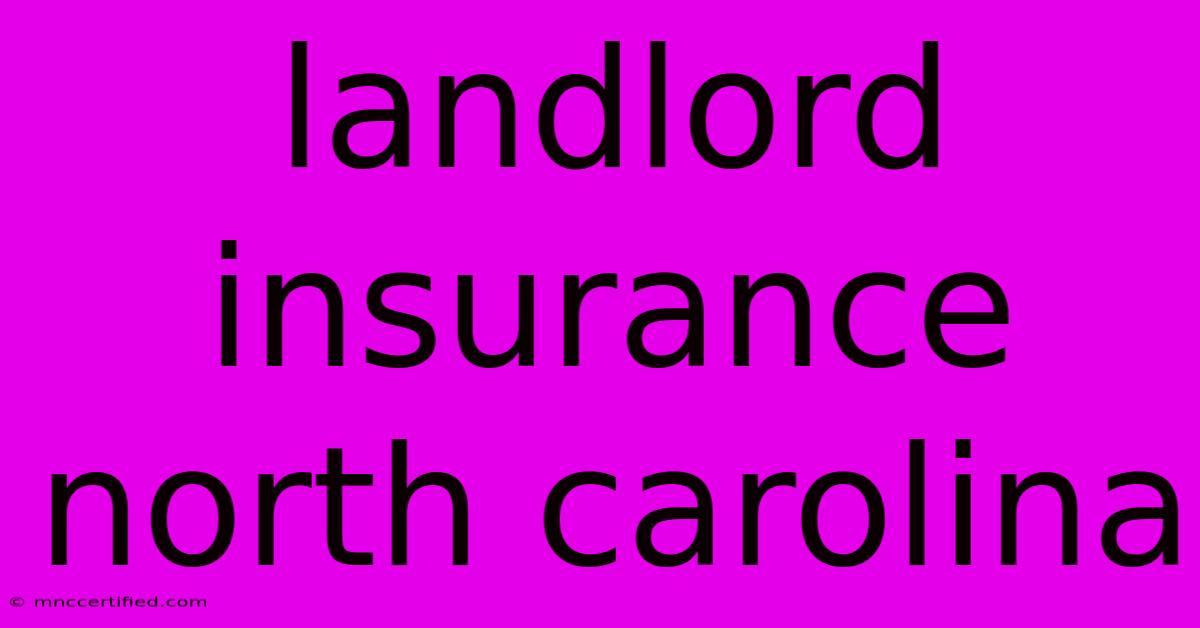Landlord Insurance North Carolina

Table of Contents
Landlord Insurance North Carolina: Protecting Your Investment
Finding the right landlord insurance in North Carolina is crucial for protecting your investment property and your financial future. This comprehensive guide will walk you through everything you need to know, from understanding the different types of coverage to finding the best policy for your specific needs. We'll cover key aspects like liability, property damage, and loss of rent, ensuring you're fully informed before you choose a policy.
Why is Landlord Insurance Essential in North Carolina?
Owning rental properties in North Carolina comes with significant responsibilities. While standard homeowner's insurance won't cover the liabilities associated with renting out your property, landlord insurance offers vital protection against various risks. These risks include:
- Liability for tenant injuries: If a tenant is injured on your property due to negligence (e.g., a faulty staircase), you could face expensive lawsuits. Landlord insurance covers legal fees and settlements.
- Property damage: Damage caused by fire, storms, vandalism, or even tenant negligence can be devastating. Landlord insurance helps cover repairs or rebuilding costs.
- Loss of rental income: If your property becomes uninhabitable due to damage, you lose rental income. Loss of rent coverage helps compensate for this loss.
- Liability for tenant actions: Damage caused by tenants or their guests can be covered under your policy.
North Carolina Specific Considerations
North Carolina has its own set of legal requirements and common risks to consider. Understanding these specifics is vital when selecting your landlord insurance:
- State Laws: Familiarize yourself with North Carolina's landlord-tenant laws regarding liability and property maintenance.
- Weather Events: North Carolina is prone to hurricanes, thunderstorms, and other severe weather events. Ensure your policy adequately covers these risks.
- Local Ordinances: Check for local building codes and regulations that might impact your insurance coverage.
Types of Coverage in a North Carolina Landlord Insurance Policy
A typical North Carolina landlord insurance policy includes several key coverages:
- Dwelling Coverage: This covers damage to the building's structure, such as the roof, walls, and foundation.
- Liability Coverage: This protects you from lawsuits stemming from tenant injuries or property damage caused by your negligence.
- Personal Liability Coverage: This protects your personal assets from lawsuits related to your rental property.
- Loss of Rent Coverage: This covers your lost rental income if the property becomes uninhabitable due to a covered event.
- Additional Living Expenses (ALE): If your property is damaged and uninhabitable, ALE helps cover temporary housing costs.
Optional Coverages to Consider
Depending on your specific needs and the risks associated with your property, you may want to consider adding optional coverages like:
- Fair Rental Value: Covers the loss of rental income while the property is being repaired.
- Building Ordinance or Law Coverage: Covers the cost of bringing your property up to current building codes after damage.
- Flood Insurance: While not typically included, flood insurance is crucial in flood-prone areas of North Carolina. This is usually purchased separately.
Finding the Right Landlord Insurance in North Carolina
Choosing the right policy involves comparing quotes from multiple insurers. Consider these factors:
- Coverage Amounts: Ensure your coverage limits are sufficient to cover the potential costs of repairs, rebuilding, and legal fees.
- Deductibles: Higher deductibles result in lower premiums, but you'll pay more out-of-pocket in case of a claim.
- Premiums: Compare premiums from different insurers to find the most affordable option without compromising coverage.
- Insurer Reputation: Choose a reputable insurer with a strong financial rating and positive customer reviews.
Where to Find Landlord Insurance in North Carolina
You can find landlord insurance in North Carolina through various channels:
- Independent Insurance Agents: They can compare quotes from multiple insurers to find the best policy for your needs.
- Online Insurers: Many online insurers offer convenient online quoting and application processes.
- Direct Writers: Some insurance companies sell directly to consumers, but may offer less personalized service.
Protecting Your Investment: Key Takeaways
Landlord insurance is a vital investment for protecting your rental property in North Carolina. By understanding the different types of coverage, considering your specific risks, and comparing quotes from multiple insurers, you can find the right policy to safeguard your financial future. Don't delay – secure your investment today. Remember to regularly review your policy to ensure it still meets your needs as your circumstances change. Contacting an insurance professional is always advisable for personalized guidance.

Thank you for visiting our website wich cover about Landlord Insurance North Carolina. We hope the information provided has been useful to you. Feel free to contact us if you have any questions or need further assistance. See you next time and dont miss to bookmark.
Featured Posts
-
Leeds Parish Visit Reeves Learns
Nov 19, 2024
-
Holiday Gifts Kansas City Chiefs
Nov 19, 2024
-
Best Buffalo Bills Gifts This Holiday
Nov 19, 2024
-
Do Dental Insurance Cover Veneers
Nov 19, 2024
-
Sidemens Wembley Charity Match Sells Out
Nov 19, 2024